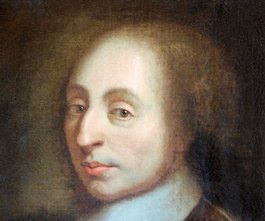Blaise Pascal
- JOHN JANARO
Blaise Pascal (1623-1662), French theologian, physicist, and mathematician, authored the iconic Pensées (Thoughts), originally entitled Defense of the Christian Religion.
 Born in Clermont-Ferrand, France, Pascal was the third of four children. His mother died when he was only three. His father Étienne, a tax collector and himself a gifted mathematician, moved the family to Paris in 1631. Recognizing that his son was a child prodigy, he home-schooled the boy. Ironically, he kept him from mathematics lest he become absorbed to the dereliction of his other studies.
Born in Clermont-Ferrand, France, Pascal was the third of four children. His mother died when he was only three. His father Étienne, a tax collector and himself a gifted mathematician, moved the family to Paris in 1631. Recognizing that his son was a child prodigy, he home-schooled the boy. Ironically, he kept him from mathematics lest he become absorbed to the dereliction of his other studies.
To no avail: Blaise began reading Euclid and teaching himself geometry at the age of twelve. At sixteen, he was already presenting his theorems at the Académie Parisienne, an informal academy established by polymath and Catholic priest Marin Mersenne.
In 1646, his father broke his hip, in those days, a potentially life-threatening injury. Pascal experienced a kind of first conversion after two of his paternal uncles, both well-respected doctors, successfully treated his father's condition.
He was initially drawn to a splinter movement within the Church known as Jansenism, later condemned as heresy for its denial of free will and other errors about grace and salvation.
His father died in 1651, leaving his estate to Blaise and his sister Jacqueline. Pascal's interest in religion waned after Jacqueline decided to enter a Jansenist-leaning convent, effectively eliminating two-thirds of his inheritance.
Then, on the night of November 23, 1654, he experienced a profound religious vision. "Fire. God of Abraham, God of Isaac, God of Jacob," began his written memorial of the experience. He reputedly sewed the document into his coat and kept it close to his person forever after.
He reputedly sewed the document into his coat and kept it close to his person forever after.
After a two-week retreat in January 1655, he began writing his first religious work: Provincial Letters.
As a mathematician meanwhile, along with Pierre de Fermat, Pascal established the foundation for the modern theory of probabilities. He invented an early version of the computer known as the Pascaline. The Pascal unit (Pa) was so named in the 20th century due to his discovery 300 years earlier that atmospheric pressure can be estimated in terms of weight.
His biographer Donald Adamson described him as "precocious, stubbornly persevering, a perfectionist, pugnacious to the point of bullying ruthlessness yet seeking to be meek and humble." Since adolescence Pascal had been in ill health, suffering especially from gastric disorders and insomnia.
"Sickness is the natural state of Christians," he observed, and died of stomach cancer at thirty-nine.
Les Pensées, a body of notes in the form of a treatise on Catholic apologetics, was published posthumously. His work on the law of probabilities led him to theorize in the well-known passage "Wager" that the skeptic has more to lose by not believing and being proved wrong after death.
Pascal thereby gave us one more example of the fact that science isn't antithetical to religion. Science bows to it.
 This is Meaghen Gonzalez, Editor of CERC. I hope you appreciated this piece. We curate these articles especially for believers like you.
This is Meaghen Gonzalez, Editor of CERC. I hope you appreciated this piece. We curate these articles especially for believers like you.
Please show your appreciation by making a $3 donation. CERC is entirely reader supported.

Acknowledgement
 John Janaro "Blaise Pascal." Magnificat (April, 2019).
John Janaro "Blaise Pascal." Magnificat (April, 2019).
Reprinted with permission of Magnificat.
The Author

 John Janaro is Associate Professor Emeritus of Theology at Christendom College. He is a Catholic theologian, and a writer, researcher, and lecturer on issues in religion and culture. He is the author of Never Give Up: My Life and God's Mercy and The Created Person and the Mystery of God: The Significance of Religion in Human Life. He is married to Eileen Janaro and has five children.
John Janaro is Associate Professor Emeritus of Theology at Christendom College. He is a Catholic theologian, and a writer, researcher, and lecturer on issues in religion and culture. He is the author of Never Give Up: My Life and God's Mercy and The Created Person and the Mystery of God: The Significance of Religion in Human Life. He is married to Eileen Janaro and has five children.




